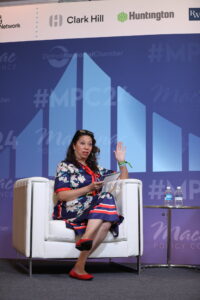When it comes to politics, Generation Z is completely up for grabs, Angelique Power, president of The Skillman Foundation, said while convening a panel at the Mackinac Policy Conference.
“They are not beholden to one party or another, [and are] extremely values-driven. They vote with their dollars, their social media platforms and they also vote on who has pissed them off the most and who has engaged with them the least,” Power said Wednesday. “Often in spaces like this we talk about young people without young people.”

Even though the imprint of young people on election is undeniable, especially in Michigan where the state topped the nation in Gen Z voter turnout in both 2020 and 2022, elected officials and candidates are not reaching out to young people, Power said.
Gen Z, which is generally considered to include those born between 1997 and 2012, represents 41 million voters in 2024.
Young people don’t feel seen by elected officials, said Esther Guerrero, youth and community organizer for Congress of Communities. They’re left pulling together solutions for themselves for the things they care about and they’re navigating heightened political times where civil discourse is strained.
Gen Z is not buying the status quo and they’re demanding to be heard by elected officials, said Jacob Manning, grassroots coordinator and policy adviser for the Small Business Association of Michigan (SBAM).
“I think that we’re in a moment now where it is not politically advantageous to be older. I think that there’s a lot of natural tension between young people and old people right now,” Manning said. “I think that Gen Z in particular is very dismissive of Boomers and I think that it makes young people feel like when they’re not being listened to, you look at who’s in charge and it’s a bunch of old people.”
And the divide is even between those fairly close in age, said Guerrero. Gen Zs love making fun of Millennials, but Millennials and Gen Zs can team up to accomplish more together than they can pointing fingers at their differences of living through the 1990’s and early 2000s.
“I think the youth that I work with love Millennials. I think it’s things that Millennials say that make them giggle or make them laugh, but I think feeding into that, because that’s always a good thing. And if you create a comfortable relationship with young people, they’ll always be open to you and always be willing to work with you and that can be done by feeding into the Millennial jokes,” Guerrero said.
Both Gen Zs and Millennials are struggling with finding affordable housing and paying off student loans, Manning said, so there’s room for common ground as “natural allies” against the perils of navigating the current state of the world.
And the state of the world does weigh on young people, Guerrero said, noting the pro-Palestinian college encampents that have cropped up in Michigan and around the country.

“We’re kind of this generation that’s full of anxiety. We went through 9/11 and the [Great Recession] as kids, and now we’re growing up, we’re witnessing war right before our eyes, all these things that just make us want to lock ourselves up in a room and not talk to anyone,” Guerrero said.
Gen Z also grew up in a time where parents didn’t have apps or filters to oversee kids’ habits on the internet and the content they were engaging with, Manning said. There’s a general understanding how social media has impacted young women’s self image, but there needs to be conversation about content consumption.
“We grew up in the wild west and I think that that was damaging, in my opinion, for Gen Z. … Unless you’re speaking with members of Gen Z every day, like we are, I think that you would realize how many people are incredibly pessimistic,” Manning said. “I think that I talk to people on a regular basis who think that everything’s going to hell fast and I think that it’s concerning, and it’s not good for your mental health to kind of constantly be surrounded online by all of these things that further these feelings.”
GET THE MORNING HEADLINES DELIVERED TO YOUR INBOX
This post was originally published on this site be sure to check out more of their content







